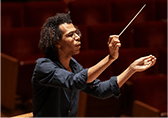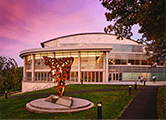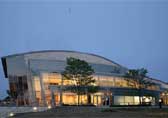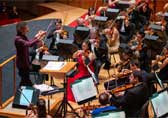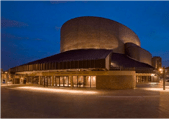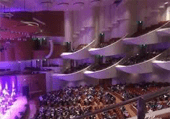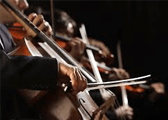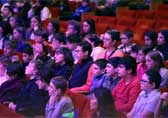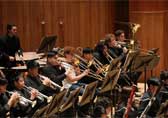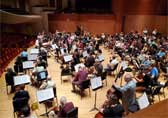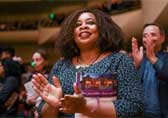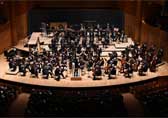Friday, December 18, 2020
Dear Friends:
The members of the BSO family have made remarkable progress together. With the steadfast support of many people who care deeply about the BSO, that progress is continuing despite the pandemic.
As we maintain our shared commitment to the organizational transformation that is underway, we have also recommitted ourselves to the work of diversity, equity, and inclusion (DEI) – knowing that the BSO, and the orchestral field at large, did not get to a place of racial and gender imbalance overnight, and that it will take time to realize change. That said, we are collectively committed to the journey, are proud of recent steps taken, and are focused on moving forward with only greater intentionality. The BSO has presented numerous composers and performers of color over the years, and Music Director Marin Alsop has been a leading advocate for equity in and through the arts, in particular women composers and conductors, including founding the OrchKids program in Baltimore more than a decade ago. A program now serving 2,000 Baltimore City Pre-K-12th grade students and their families across ten schools, the OrchKids team has continued to provide high quality musical learning, academic support, and stability throughout the pandemic. In fact, they have maintained an 87% attendance rate for a virtual fall 2020. However, support to continue these substantial efforts is needed now more than ever. We encourage everyone to learn more about OrchKids and how you can help at www.orchkids.org.
In building upon this foundation, vitally important work lies ahead, and we remain committed to listening, to learning, and to acting. What follows is a recap of our intentions as shared earlier this year, and an update on recent progress and steps taken since July 2020:
1. Investing in Learning and Training: We are engaged in important conversations to help build the capacity of the BSO to foster increased diversity, equity, and inclusion, with a focus on racial justice. We cannot do this alone and must engage leaders who can help us pursue this important work authentically and thoughtfully. In approaching this work, we also recognize an opportunity to build a diverse and talented administrative team and Board that better represents our community.
- We have held seven facilitated DEI-focused sessions for BSO stakeholders including our Board, musicians, staff, and several committees, along with multiple conversations with members of our management team.
- We have developed and are working from a three-year plan (through 2022) to address Board diversity. Specifically, and with the leadership of our Governance Committee Chair Christian Johansson, prioritizing greater representation of women; individuals of color; individuals connected with different communities; and individuals under the age of 50, with Board members considered in terms of their holistic merits and not limited to their capacity to donate to the BSO. As of October 2020, we had moved from an 8% representation of BIPOC members of the Board to 17%, among other considerations of fostering diversity.
- In addition to forming an internal staff DEI task force, we have established a DEI Committee of the Board, chaired by Barry Williams, a committee which also includes staff and musicians.
- Despite an overarching hiring freeze in response to the financial pressures of the pandemic, the BSO created, posted (in September) and is presently interviewing for a new senior leadership position dedicated to Senior Director of HR and Inclusion. The importance of this position, as in all positions, warrants a thoughtful search process. It is certainly our goal to have this positioned filled as soon as possible
2. Pursuing Increasingly Diverse Programming: We are committed to collaborating with national leaders driving diversity in the arts to help foster collective action toward equitable representation of composers in classical music. In addition to performing more music by Black composers, and engaging more artists of color, in our own seasons, we will redouble efforts to enrich our community through Symphony in the City and other programs, as we also support the ongoing work of OrchKids.
- We have expanded our artistic team to welcome incredible talent as well as greater diversity in programming and at the artistic planning table. Our new Assistant Conductor Jonathan Rush has been instrumental to our virtual concert series, and our new Artistic Partner Wordsmith is actively collaborating in artistic and educational programming for this and future seasons. For example, Wordsmith penned a new version of ‘Twas the Night Before Christmas airing as part of our December 16 Holiday episode of BSO Sessions that looked at the challenging year of 2020 from a perspective of social justice, politics and the pandemic, and will be narrating and collaborating on upcoming Midweek Concerts: BGE Broadcasts. Midweek Broadcasts are a virtual adaptation of our curriculum connected educational concert series, now available FREE to all teachers, students, parents via BSOOffstage.
- We have developed and released BSO Sessions, bringing the stories of BSO musicians, conductors, and collaborators to life through a documentary-style narrative paired with robust and inclusive programming – including the music and stories of Black and women composers. 74% of classical Sessions episodes (10 of 12 Sessions episodes currently available through January) feature representation by BIPOC or women composers, with two episodes devoted exclusively to BIPOC composers.
- The BSO has joined New Music USA’s Amplifying Voices program. Through this consortium, the BSO will co-commission a piece by Jessie Montgomery to premiere in our 2022-23 Season.
- Looking ahead to the 2021-22 Season, which we will announce later in the spring, we continue to plan with intentionality and focus. There will be an increased representation of composers who are either BIPOC or women, and the same is true of the guest conductors who will lead concerts by our great orchestra – with +40% of all Classical subscription series weeks including representation of BIPOC or women conductors; and, +40% of the same programming including representation by BIPOC or women composers.
3. Pursuing Greater Diversity on the Stage: Recognizing a need for greater diversity on the stage, we will work with Maestra Alsop and our musicians to provide greater access, positions, and increased participation of musicians of color in the orchestra, renewing our collaboration with entities like the Sphinx Organization in the process.
- Our extraordinary new multi-year agreement (effective as of September 2020) supports achievement of goals outlined in the BSO’s strategic plan – an adjustment in work rules to seed new and increased audience, community and donor engagement activities as well as programmatic innovations in Baltimore, in Montgomery County and throughout Maryland. It also provides a runway for restoring critical vacancies, gradually filling open vacancies in the years ahead, and importantly made possible an entirely new and vital framework for approaching the audition process with an intentional view of increasing the diversity within our orchestra, particularly players of color.
- A full revaluation of orchestral hiring procedures and the audition culture is an important next step, as are national partnerships such as our work with Sphinx (including meaningful fellowship programs with an emphasis on cohorts), so that we not only fill critical vacancies but are intentional in this recruitment as we look ahead to the time when the live audition process can resume post-COVID-19. Our musicians will be critical in this work, which is subject to our collective bargaining agreement.
- We have joined the National Alliance for Audition Support – a national initiative to increase diversity in American orchestras. This initiative offers Black and Latinx musicians mentoring, audition preparation, financial support, and audition previews, including a paid commitment by all participating orchestras.
4. Establishing a New Code of Conduct: When we are able reopen our venues, it will be with a newly crafted code of conduct that reflects our shared commitment to creating a safe, comfortable, and enjoyable environment in which all individuals – patrons, staff, artists, and volunteers – are treated with humanity, respect, and dignity. This will apply to all of us, and we will be working with our staff in the training and implementation necessary to ensure that these are not just words but embraced as core to the BSO’s culture and our shared goals as an organization.
These efforts reflect a shared commitment and will help us continue to make progress, which we know remains needed, and continue to measure and hold ourselves accountable over time.
Sincerely,

Peter T. Kjome
President and CEO
